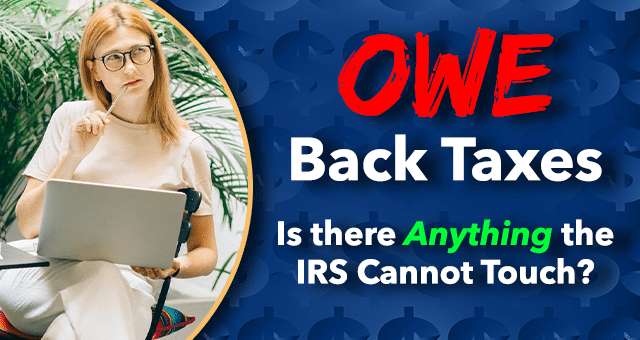
If You Owe Back Taxes, is there Anything the IRS Cannot Touch?
- Posted by Joshua Sells
- On April 11, 2022
- back taxes, back taxes owed, IRS Back Taxes, IRS Tax Attorney, jmsellslaw, tax attorney, tax relief, Tax Resolution
If You Owe Back Taxes, is there Anything the IRS Cannot Touch?
The process of paying taxes is confusing for nearly every taxpayer, and one that simply grows more complex as you take home more income. As such, it’s not uncommon for mistakes to be made, and for some to find themselves suddenly owing “back taxes” to the government.
Don’t worry: Though the prospect of having overdue taxes can be frightening, there are a few routes you can take to still achieve the best outcome possible. So, in this article, we’ll review what you need to know about IRS back taxes and what they could mean for you and your assets.
What Are Back Taxes?
Back taxes are simply another name for taxes you have yet to pay from a previous year. The reasons as to why someone might have back taxes owed vary, as they could be a result of intentional decisions or accidental mistakes. A few common causes include:
- Failing to file a tax return
- Failing to report all earned income from the tax year
- Failing to pay a return’s tax liability
Neglecting to pay the tax amount identified on your tax return by the due date can cause you to receive the IRS’ Failure to Pay Penalty. This requires the recipient to pay “0.5% of the unpaid taxes for each month or part of a month the tax remains unpaid” — up until 25% of the tax owed is received.
That’s not all, however, as the IRS will also charge interest on your tax debt based on that quarter’s interest rate. If left unsolved for long enough, this could allow the amount to grow significantly and become a major issue, especially if you do not have the means to cover it.
What Happens if You Don’t Pay Back Taxes?
There are a few serious repercussions individuals can face if they fail to pay their IRS back taxes. As with most major issues, the organization will need to examine your specific circumstances prior to assigning any consequences, though they’re likely to include:
- Growing Debt: As mentioned above, the interest charged on top of your owed amount will only make it more difficult to eliminate those back taxes
- Wage Garnishment: Don’t expect the IRS to simply forget about your debt. If you avoid the issue for long enough, you could find yourself facing serious consequences like garnished wages — an order that requires your employer to withhold a portion of your income to be sent directly to the IRS. During this time, the government could also retrieve your driver’s license, passport, and other essential items to further compel you to address those back taxes owed.
- Seized Assets: One of the most frightening consequences of this scenario involves a tax levy, which allows the IRS to legally seize your assets and sell them until the amount owed is satisfied. This could include items such as real estate or business property, vehicles, bank accounts, and more.
- Associated Costs: Once things grow serious, there are few other resources to turn to other than an experienced tax professional who can help you avoid complete disaster. Of course, professional services don’t come free — especially in a situation involving severe back taxes — which is just another expense to add on top of your government debt.
- Damaged Credit: Following these repercussions, you should also expect your credit to take a serious hit. For instance, if the government places a tax lien on your home, it could limit your ability to receive or increase your credit.
Is There Anything the IRS Cannot Touch?
A tax lien and tax levy is the “last resort” the IRS will take to encourage someone to pay their debt. Because of the severe implications they pose, it’s important to have a clear understanding of what either one could mean for you.
Tax Lien
This will specifically concern your property when owing back taxes. Still, its interactions depend on which type of government your debt is associated with:
- Local Governments: Can place a tax lien for unpaid local income or property taxes.
- Federal and State Governments: Can place a tax lien for unpaid income taxes.
Now, a lien doesn’t immediately mean your property will be sold. Rather, it simply places the government in first place to claim the assets it has been assigned to. Furthermore, the lien will restrict your ability to refinance or sell your property until after your debt is settled.
Tax Levy
This is the next, most severe course of action the government will take to receive their IRS back taxes from an uncooperative taxpayer. Essentially, it allows them to seize and sell your assets until they’ve covered the money owed to them. Some of these items could include vehicles, boats, bank accounts, rental income, retirement accounts, wages, and more.
Now, there are a few assets the IRS might not touch if you have back taxes owed. Some items that legally cannot be seized include:
- Necessities: Anything that you and your family needs to survive cannot be touched, such as your primary residence, clothing, supplies, or a vehicle you solely use to go to work or school (though the latter might depend on the availability of public transportation in your area).
- Tools and Furniture: Work tools valued under $3,520 and furniture valued under $7,720 are also safe from being claimed.
- Sole Sources of Income: Though it’s capable of seizing welfare and unemployment payments, the IRS likely won’t do so if these are your only sources of income. Still, it may direct up to 15% of your Social Security payments towards your debt amount.
- Items of No Value: Though the IRS is known to go to extreme lengths, it won’t strip your house of all possessions for the mere sake of it. Any items you own that have no value or cannot be sold will not be removed from your possession.
How Can I Avoid Receiving a Tax Lien or Tax Levy?
If you find yourself facing the frightening situations listed above, you shouldn’t hesitate to reach out to a qualified tax professional who can help you navigate any IRS back taxes you owe. Don’t wait for disaster to strike: Contact J. M. Sells Law to start solving your tax problems today!


0 Comments